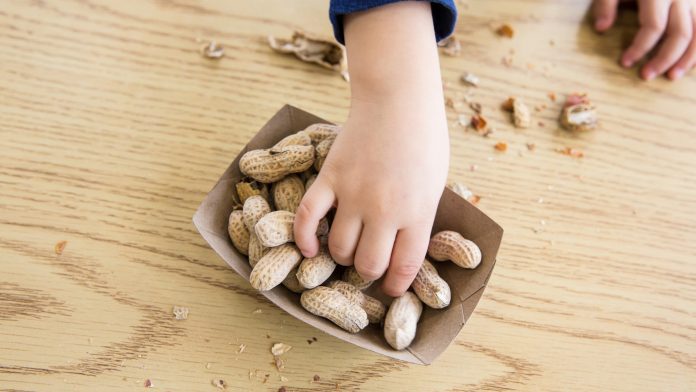
A study has found that encapsulated stool from donors without peanut allergies altered the immune system and tolerance to peanuts.
Peanut allergies are common, affecting around 2% of children in the UK, and has become increasingly widespread in recent decades. Peanut allergies are persistent, with approximately only one in five children outgrowing their allergy, usually by the age of ten.
The first-of-its-kind clinical trial at Boston Children’s Hospital found that faecal microbiota transplants (FMT) from healthy, non-allergic donors, allowed some severely allergic young adults to consume small amounts of peanut safely.
Rima Rachid, MD, lead investigator and co-director of the Food Allergy Program at Boston Children’s, previously presented the findings at the American Academy of Allergy, Asthma & Immunology (AAAAI) annual meeting.
The FMT treatment was derived from stool samples provided by healthy, non-allergic donors and delivered in frozen capsules. It enabled some study participants who initially had allergic reactions to less than half a peanut, to have the ability to consume more than two peanuts before reacting. “That amount may be enough to eliminate concern about traces of peanut in foods,” explained Rachid.
“These results were very encouraging,” said Rachid. “A single FMT led to a significant increase in the threshold of reactivity to peanut at both one month and four months after treatment, showing that the effect was prolonged. This study is offering hope that microbiome interventions may be effective in food allergy.”
FMT and peanut allergy
Increasing evidence supports the idea that the bacteria living in our intestines help shape our immune systems. FMT acts by replacing the intestinal bacteria of patients suffering from peanut allergies, with that of non-allergic donors. The donors in this study were screened by OpenBiome, a non-profit stool bank in Cambridge, Mass.
The Phase 1 open-label trial enrolled 15 participants, aged 18 to 33, who had an allergic reaction to 100 milligrams of peanut (half a peanut) or less. They all received FMT, which meant swallowing 36 capsules over three hours. One phase of the study involved ten participants who received a single dose of FMT alone. Three were able to tolerate larger amounts of peanuts – one as much as four peanuts – when challenged both one and four months after FMT.
In the second phase, five participants were pretreated with antibiotics as an extra measure to kill off their microbiome, clearing the way for the donor bacteria. Three of the five (60%) suffered from worst peanut allergies after FMT.
The study found no serious adverse reactions to FMT. Whilst the number of participants was small, laboratory tests were consistent with the clinical results. Furthermore, the study found that participants who responded to FMT had increases in the regulatory T cells associated with immune tolerance and reductions in the T helper cells associated with peanut allergies.
When their microbiomes were transplanted into a strain of allergy-prone mice, the mice showed similar immune changes and were protected from anaphylaxis when challenged with food allergens. In contrast, when the non-responders’ microbiomes were transplanted, the allergic mice were not protected.
“This shows that the therapeutic response to FMT is microbiome-related,” noted Rachid.
Possibility for new treatment
Food allergies are often treated by gradually increasing amounts of peanuts people consume whilst under medical supervision, sometimes together with medications to suppress their immune response. “But this method is not curative and is not effective in adults,” said Rachid.
“The long-term effect of oral immunotherapy is not clear, and many patients stop therapy over time,” she observed. “Additionally, it requires daily administration and is not without risks of allergic reactions. Microbiome interventions are very promising alternatives for treating food allergy.”
This clinical trial is based on years of previous work with Rachid and her colleagues; the comparison of intestinal bacteria in babies with and without allergies began in 2019. In this previous study, the researchers established that the stool bacteria in babies with food allergies were different from those in non-allergic babies.
Researchers then experimented with FMT in mice, transplanting faecal bacteria from the babies into allergy-prone mice. Mice given faecal bacteria from food-allergic babies went into anaphylaxis when challenged with an allergen; those given faecal bacteria from healthy babies did not.
Rachid now hopes to conduct a Phase II clinical trial in 12- to 17-year-olds, providing antibiotic pre-treatment and a purified Microbial Transplantation Therapy (MTT) preparation in collaboration with Alexander Khoruts, MD, from the University of Minnesota. The preparation can be stored in a home refrigerator, avoiding the need for patients to come to the clinic to be treated.
“Home administration makes microbiome interventions very attractive,” concluded Rachid.
























